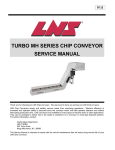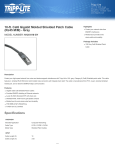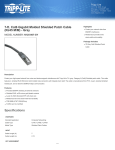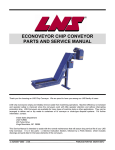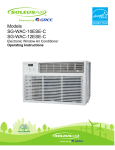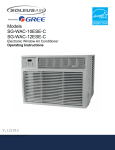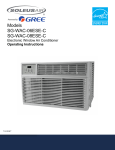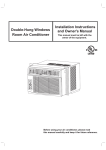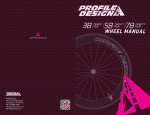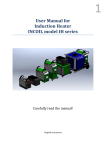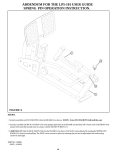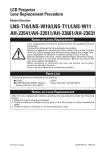Download Microfine 3 Service Manual
Transcript
Instruction Manual LNS Turbo 203 Turbo Drive Kings Mountain, NC 28086 ENG V1.00 TABLE OF CONTENTS CHAPTER 1: INTRODUCTION................................................................................... 1-1 1.1 Basic introduction ............................................................................................................................ 1-2 1.1.1. Symbols and terminology ................................................................................................... 1-2 1.2. Rights ................................................................................................................................................ 1-3 1.3. Characteristics ................................................................................................................................ 1-4 1.3.1. Floor plans .................................................................................................................................. 1-4 CHAPTER 2: SETTING INTO OPERATION .......................................................... 2-1 2.1. Transportation ..................................................................................................................................2-2 2.2. Unpacking ........................................................................................................................................ 2-2 2.3. Lifting the conveyor ........................................................................................................................ 2-3 2.4. Safety devices ................................................................................................................................. 2-3 2.4.1. Description .................................................................................................................................. 2-4 2.4.2. Layout of the safety elements on the conveyor (Top mount drive version shown) ..................... 2-4 2.4.3. Installation safety ........................................................................................................................ 2-5 2.4.4. Security analysis for the correct incorporation ............................................................................ 2-6 2.5. Installation and startup ................................................................................................................... 2-7 2.5.1. Conveyor drive ............................................................................................................................ 2-7 2.5.2. Leveling....................................................................................................................................... 2-7 2.5.3. Coolant filling ............................................................................................................................... 2-7 2.5.4. Electrical connection ................................................................................................................... 2-8 2.5.5. Setting the voltage of the motor .................................................................................................. 2-9 2.5.6. Electrical control .......................................................................................................................... 2-9 2.5.7. Pre-start check .......................................................................................................................... 2-10 CHAPTER 3: CONVEYOR BELT .................................................................................. 3-1 3.1. Belt tensioning – Checking the tension ........................................................................................ 3-2 3.2. Belt tensioning – How to tension the belt ................................................................................. 3-3 3.3. Belt assemblies ............................................................................................................................... 3-4 3.3.1. Standard and Heavy Duty belts ................................................................................................. 3-4 3.3.2. Super Heavy Duty belts ........................................................................................................................................................................ 3-5 3.3.3. Lower conveyor – Scraper belt parts .......................................................................................... 3-6 CHAPTER 4: MAINTENANCE ................................................................................... 4-1 4.1. Periodic inspection ........................................................................................................................ 4-2 4.1.1. After first 100 hours ............................................................................................... 4-2 4.2. Cleaning ........................................................................................................................................... 4-3 4.3. Factors affecting performance................................................................................................... 4-3 TURBO MF3 CHAPTER 5: OPTIONS.......................................................................................................... 5-1 5.1. Air header ........................................................................................................................................................ 5-2 5.2. Chip stripper bar ............................................................................................................................................. 5-4 5.3. Spare parts ...................................................................................................................................................... 5-5 5.3.1. Layout of the elements .............................................................................................................................. 5-5 CHAPTER 6: APPENDICES ...................................................................................................... 6-1 Appendix A: Ordering form................................................................................................................................... 6-2 Appendix B: Address LNS .................................................................................................................................... 6-3 TURBO MF3 CHAPTER 1: INTRODUCTION 1-1 CHAPTER 1: INTRODUCTION TURBO MF3 1-2 CHAPTER 1: INTRODUCTION 1.1 Basic introduction LNS conveyors simply and reliably remove waste from machining operations. Machine efficiency is increased and operator safety is improved since the conveyors work with little operator attention and without interrupting production time. LNS Turbo conveyors are available for many types of machine tools or other applications. They can be arranged to deliver wet or dry waste to containers or to conveyor or chute-type disposal systems. For further information, contact LNS. The TURBO MF3 conveyor was specifically designed for applications where mixed chips are produced. The dual conveyor system with filtering drum ensures that both long and small chips are evacuated from the conveyor discharge. The filtering drum provides self-cleaning filtration to 50 Micron. The drum is automatically rotated by the lower conveyor chain. A back wash pump continually cleans the drum with no intervention required by the machine operator. The 50 Micron filtration means that the coolant tank is kept clean from small chips thus extending the time required between tank cleanouts. The 50Micron filtration also ensures cleaner coolant delivery from the machine pumps helping to improve machining efficiency. Combining high technology and user friendliness, it offers users a surprisingly vast number of applications, while remaining simple to use and highly reliable. Given its compact assembly, TURBO MF3 requires very little space, and allows for optimum use of the work surface. 1.1.1. Symbols and terminology This sign recommends following the directions very closely avoiding causing an incident that could result in injury, damage to the equipment, or data loss. This sign indicates that safety measures must be taken to avoid possible electrical shocks or mishaps. This sign stress interesting points or comments, and provide useful advice for optimal system operation. TURBO MF3 CHAPTER 1: INTRODUCTION 1-3 1.2. Rights All rights reserved. Reproduction, recording or transmission of all, or any portion, of this manual, in any form or through any means whatsoever, whether mechanical, photographic, sound or other, without the express written authorization of LNS Turbo, is prohibited. LNS Turbo disclaims all responsibility for errors which may be contained in this manual and the problems which may result therefrom. LNS Turbo and its subsidiaries cannot be made responsible for the debts, losses, expenses, or damage incurred, or suffered, by the buyer of this product, or a third party, following an accident, incorrect use, or misuse, or stemming from modifications, repairs, or transformations not authorized by LNS Turbo. LNS Turbo and its subsidiaries cannot be held responsible for damage and problems arising from the use of options and products other than LNS products, or products approved by LNS Turbo. The names of the products indicated in this manual are registered trademarks. All information contained in this manual is intended to be correct, however information and data in this manual are subject to change without notice. LNS Turbo makes no warranty of any kind of regard to this information or data. Further, LNS Turbo is not responsible for any omissions or errors or consequential damage caused by the user of the product. LNS Turbo reserves the right to make manufacturing changes which may not be included in this manual. LNS Turbo supplies data necessary for the proper instruction, test, operation and maintenance of this product. LNS Turbo retains all proprietary rights in and to the information so disclosed and such shall not be reproduced, copied, or used in whole or in part for purposes other than those for which it is furnished. TURBO MF3 1-4 CHAPTER 1: INTRODUCTION 1.3. Characteristics Depending on the country and the standards in effect, certain technical data, such as the power supply, may vary. Please see the technical card delivered with the device. Type Belt Belt width W-Width T-Height L-Leg location Filtration Flow rate Standard duty 19mm (0.75") 102 - 559mm (4 - 22") BW +54mm (+2.06") 260mm (10.23") 325mm (12.80") 50 µ standard up to 575 l/min Heavy duty 25mm (1.00") 102 – 610mmm (4-24") BW +93mm (+3.63") 274mm (10.80mm) 325mm (12.80") 50 µ standard up to 575 l/min Super heavy duty 38mm (1.50") 102 -914mm (4-36") BW +99mm (+3.88") 271mm (10.67") 325mm (12.80") 50 µ standard up to 575 l/min 1.3.1. Floor plans Each conveyor varies in size depending on the machine tool it is designed to fit to. Below is a general diagram which can be used to help in communications with LNS Turbo regarding size queries and inquiries. Drawing dimension A B C D E F G H. I J K L M TURBO MF3 Conveyor terminology< Baffle width Frame height Baffle height Frame width Baffle length Covered load Tail height Load length Overall length Conveyor difference in height Height above floor Discharge height Overall height CHAPTER 2: SETTING INTO OPERATION 2-1 CHAPTER 2: SETTING INTO OPERATION TURBO MF3 2-2 CHAPTER 2: SETTING INTO OPERATION 2.1. Transportation Please read the safety precautions described at the beginning of this manual before handling the following devices. Depending on its destination, the conveyor is normally secured to a pallet then heat sealed inside a protective plastic cover. All shipping documents including this manual are also secured to the pallet. Regardless of the type of packaging, the un-creating and lifting instructions recommended by LNS Turbo must be observed in order to prevent any injuries to persons and damages to objects. 2.2. Unpacking For practical and safety reasons, the conveyor must be unpacked in a spacious, well-lit location. Check to see that the lifting capacity of the hoisting crane, or lift truck, is adequate before proceeding with the handling of the merchandise. No one should be near the hanging load, or within the operating range of the overhead hoist/crane, forklift, or any other means used for lifting and transportation. 1) If the conveyor is received as shown below start by removing the protective plastic material 2) Cut any steel banding used to secure the conveyor to the pallet using side cutters (always wear eye protection and gloves) 3) Remove any screws holding the conveyor to the pallet (these may go through jacking or castor plates. TURBO MF3 CHAPTER 2: SETTING INTO OPERATION 2-3 2.3. Lifting the conveyor Check to see that the lifting capacity of the hoisting crane, or lift truck, is adequate before proceeding with the handling of the merchandise. No one should be near the hanging load, or within the operating range of the overhead hoist/crane, forklift, or any other means used for lifting and transportation. Lifting points are strategically placed around the conveyor system to allow the conveyor to be safely lifted with a fork truck or lifting straps. Otherwise points under the tank are marked with arrows (as shown below) for safe, balanced, lifting points for fork trucks to lift the conveyor system and tank assembly. Always read the weight on the conveyor and check it against the capacity of the lifting equipment before attempting to lift: Safe marked lifting points for the conveyor system. TURBO MF3 2-4 CHAPTER 2: SETTING INTO OPERATION 2.4. Safety devices The LNS Company, or its local representative, may not be held responsible for possible accidents or property damage, whether caused directly or not, by any means whatsoever, if certain safety devices have not been included. 2.4.1. Description The TURBO MF3 conveyor has been designed with a focus on maximum safety during its handling and complies with all EC requirements. Safety covers and devices make access to the moving parts of the conveyor impossible during operation. The conveyor – machine interface must ensure that the conveyor cannot run when the machine door is open. All safety interlocks on the conveyor or machine must not be over written at any time. By pressing the emergency stop button located on the machine, the functions of the lathe and conveyor are immediately stopped. W hen integrated to the machine it is important that the discharge area of the conveyor is well protected and not exposed to persons. A suitable Emergency stop cord should be integrated around the discharge of the conveyor to allow the emergency stop circuit to be activated from the conveyor discharge area. Only those who know the product and are sufficiently qualified are able to install, set into operation, maintain and fix the conveyor. The customer must ensure that internal arrangements regarding supervising the prescribed indications of the events, of work organization and staff competence is available with the assembly instructions. All persons who perform work on this machine must have read and understood the assembly instructions. 2.4.2. Layout of the safety elements on the conveyor (Top mount drive version shown) 7 1 1 2 6 3 It’s recommended that an emergency stop rope or suitable guarding protecting the discharge is fitted. 5 8 4 Designation 1 2 3 4 5 6 7 8 TURBO MF3 Description Drive cover Top cover upper curve Top cover incline upper curve Top cover incline lower curve Top cover load Bearing cover End cover discharge Drum access window CHAPTER 2: SETTING INTO OPERATION 2-5 2.4.3. Installation safety In order to ensure the proper installation of the conveyor several steps must be taken. These steps are listed below. It is possible to purchase these parts from LNS if required. Speak to your local LNS representative for further details: 1) Suitable guarding must be used between the waste receptacle and the conveyor to ensure no access to the moving belt is possible when the receptacle is in place (labeled 4 below). It is recommended to utilize an interlock between the two components to stop the belt when the receptacle is removed. In case any part of the belt is accessible then an emergency stop cord around the discharge of the conveyor must be integrated to the machine tools emergency stop circuit where the conveyor and machine are stopped immediately if the cord is pulled (labeled 1 below) 2) Suitable guarding must be installed around the area where the conveyor fits to the machine to ensure that no conveyor belt is exposed to the customer. (Labeled 2 below). 3) A suitable waste receptacle must be utilized with the conveyor to ensure a proper fit to the conveyor dimensions and working conditions (Labeled 3 below) 4) The conveyor must be integrated to the machines control circuit in such a way that the conveyor belt cannot run when the machine door is opened. (Labeled 5 below). 5) Suitable warning signs must be placed at the danger zones of the conveyor such as the discharge area to warn personnel of risk of injury. Machine Conveyor 1 4 5 2 3 TURBO MF3 2-6 CHAPTER 2: SETTING INTO OPERATION 2.4.4. Security analysis for the correct incorporation Before considering assembling the machine, it is necessary to consider the following points:: Consider security strategies that reduce risks to an acceptable level; Define the tasks required for applications to predict and assess the need of access and / or for the approach; Identify sources of risks, including failures and failure modes associated with each task. Risks can come from: o machine in which the device is integrated; o its association with other equipment, Evaluate and assess the risks associated by using the machine o programming risks o operation risks o risks of use o maintenance risks Choose methods of protection : o the use of protective devices o the introduction of signals o compliance with safe work procedures TURBO MF3 CHAPTER 2: SETTING INTO OPERATION 2-7 2.5. Installation and startup Your Conveyor has been run prior to shipment to insure proper operation. However, it is recommended that the following checks be made before startup: 2.5.1. Conveyor drive Check frame and belt for damage during shipment or storage. Locate conveyor in operating position inside the machine (see separate specific interface instructions). All drive elements (pulleys and sprockets) should be located close to their bearing supports. Each set of pulleys and sprockets should be carefully aligned to prevent excessive wear and noise. Drive chains and belts should be properly tensioned. 2.5.2. Leveling A level should be placed across tail section and on the conveyor belt in line with the direction of travel of the belt. Adjust the conveyor or tanks castors to ensure the system is level. If the system is not equipped with leveling castors or jacking screws then it may be necessary to shim the system to make it level. 2.5.3. Coolant filling Fill the coolant tank with water soluble coolant solution of your choice. If neat oil is used please consult LNS TURBO as the flow rate capabilities of the conveyor may be affected. After initial start-up, you may find it necessary to add coolant to restore the desired fluid level. This is because the conveyor load section acts as an additional reservoir and complete drain down of the conveyor does not occur even during system idle periods. Note: Do not fill the coolant tank level with coolant above the center line of the filter drum (see below). Prior to installation of the TURBO MF3, the coolant tank should be cleaned of any chip or dust residue that may be present from shipping, storage or manufacture. This will ensure a clean and trouble free start-up and prevent unnecessary cleaning at a later stage. x X = maximum fill level TURBO MF3 2-8 CHAPTER 2: SETTING INTO OPERATION 2.5.4. Electrical connection Particular attention should be given to the handling of electrical elements because of risks of electrocution. In case of possible electrical malfunctions, it is advisable to contact LNS or their local representative. It is strictly prohibited to make adjustments as long as the conveyor is under electrical power. The adjustments of the electrical equipment must only be performed by qualified personnel in line with local regulations. During the installation, ensure that the motor is wired in accordance with the supply voltage available. The supply voltage of the conveyor is indicated on the electrical drawing supplied in the conveyors control panel. If no control panel is supplied then the voltage can be checked directly at the conveyor motor terminal box as shown below in section 2.5.5. Even if the electrical drawing is correct to the machines requirements the conveyor motor should be checked to ensure the voltage setting is correct to prevent possible damage. 5 6 7 8 2 1 3 4 Designation 1 2 3 4 5 6 7 8 TURBO MF3 Description Motor terminal box upper conveyor Cable from control box to upper conveyor motor Terminal box back wash pump motor Cable from control box to back wash pump motor Control box Motor terminal box lower conveyor Cable from control box to lower conveyor motor Cable from control box to be connected to the machine CHAPTER 2: SETTING INTO OPERATION 2-9 2.5.5. Setting the voltage of the motor If the voltage does not correspond, the wiring of the motor must be modified: 2.5.6. Electrical control Your conveyor may or may not be supplied with an electrical control depending on the machine and applications’ requirements. If an electrical control is supplied then please see the electrical drawing inside the control panel for specific details. If any faults with the conveyor control occur or further information is required please consult your local LNS agent.DO NOT DRILL HOLES IN CONVEYOR FRAME TO MOUNT POWER BOXES OR ACCESSORIES WITHOUT FIRST CONSULTING LNS TURBO. Arrows show forward movement of the belt on both belts of the conveyor and the direction of rotation of the drum. Note that the hinge and scraper belts are running in opposite directions to ensure correct operations of the conveyor system the directions must be correct as per the drawing above. TURBO MF3 2-10 CHAPTER 2: SETTING INTO OPERATION Danger. Do not turn on electrical supply prior to completing the pre-start check list that follows 2.5.7. Pre-start check A back-wash pump is generally supplied with your TURBO MF3 conveyor and is pre-connected (see the drawing in section 2.5.4). If your TURBO MF3 conveyor was ordered without a back wash-pump that supplies continuous coolant flow through the nozzles to clean the filter drum, ensure that a pump source is used that supplies consistent, clean, continuous coolant flow. Spindle pumps are not recommended for this application because they are used intermittently and will result in inconsistent pressure and flow depending on when the spindle coolant is being used. Failure to supply continuous back-wash flow to clean the filter drum can result in coolant overflows from the conveyor into the clean side of the coolant tank. The pump should have a flow of 35L/min at 1.5 bar pressure. No special pre-start preparations are required for the filter drum. However, it is advisable to inspect the inlet area to the rear of the drum and the conveyor load section belt. Remove any foreign objects or material that may remain from shipment packaging. A visual check of the filter area is also recommended to ensure absence of foreign material within the filter housing this can be done by looking through the inspection window located on each side of the lower conveyor frame. TURBO MF3 CHAPTER 3: CONVEYOR BELT 3-1 CHAPTER 3: CONVEYOR BELT TURBO MF3 3-2 CHAPTER 3: CONVEYOR BELT 3.1. Belt tensioning – Checking the tension Please read the safety instructions provided at the beginning of this manual before carrying out any maintenance on the conveyor. Correct conveyor belt tension is essential to ensure proper operation and extended life of the conveyor components. The belt has been properly tensioned during factory assembly. As normal wear occurs the belt may become slack and need adjustment. The following factors may be used to determine whether the belt needs adjustment. Belt too loose: Belt slack at exit point of the drive sprocket before re-entry into frame (see illustration). Belt too tight: Belt has intermittent jerks and a popping sound while the conveyor is in operation. Uneven tension (side to side): The belt tends to track to one side. An indication of this is excessive wear on outside of side wings as shown below: Excessive wear will be seen on the edge of the side wing. Check to see that the clutch body is square to the bearing mounting bracket. If it is not, this will generally indicate which direction the belt is off on side to side tension. Once it is determined that re-tensioning of the belt is necessary, the following procedure should be followed: TURBO MF3 CHAPTER 3: CONVEYOR BELT 3-3 3.2. Belt tensioning – How to tension the belt (Torque wrench required) 1. Tighten the bolts that attach the drive shaft bearings to the conveyor (labelled 2 below) then loosen 1 ¼ turns. (This step ensures that bearing is parallel to bearing mount surface and that the lock washer is not adding additional torque to the reading.) 2. Set the torque wrench to 2.8Nm. Tighten (clockwise) each bearing adjusting bolt (labelled 1 below) on each side of the conveyor, alternately until 2.8Nm is obtained and torque wrench no longer turns adjusting belt, but clicks at rotation. 3. Manually rotate belt back and forth. (This distributes tension evenly throughout the belt). 4. Repeat steps (2) and (3) until belt rotation no longer results in decreased torque setting. This step ensures that both sides of belt are tensioned equally.) Lock the adjusting bolts. 5. Run machine for a two-hour break-in period. 6. Loosen adjusting belt lock nuts. Loosen bearing belts as noted in step (1). Repeat steps (2), (3), and (4). The belt must be re-torqued to obtain correct tension after break-in period (see guide below). 2 1 NOTE: Belts with load lengths in excess of 2500mm may require higher torque settings application or different widths can also affect the required torques settings. Contact LNS Turbo UK Ltd if assistance is needed. Torque Guide Overall Length to 5700 mm Overall Length 5700 to 9500 mm Overall Length 9500 mm and over 2.8 Nm 4.0 Nm 5.1 Nm TURBO MF3 3-4 CHAPTER 3: CONVEYOR BELT 3.3. Belt assemblies Please read the safety instructions provided at the beginning of this manual before carrying out any maintenance on the conveyor. 3.3.1. Standard and Heavy Duty belts 6 7 5 4 3 1 12 2 8 9 Item No. 1 1 1 2 3 4 5 6 7 8 9 10 11 12 TURBO MF3 Description Hex head screw Lock washer Tail disc (on inside of frame) Hinge plate w / cleat Hinge plate Hinge plate / w / wiper cleat Wiper Washer Hex head screw Side wing Roller Washer Link pin Cotter pin 10 11 CHAPTER 3: CONVEYOR BELT 3-5 3.3.2. Super Heavy Duty belts 2 3 11 10 12 13 5 8 6 9 1 7 8 4 Item No. 1 1 1 2 3 3 3 4 5 6 7 8 8 9 10 11 12 13 Description Hex head screw Lock washer Tail disc (on inside of frame) Hinge plate w / cleat Hinge plate assembly Side wing – right hand Side wing – left hand Hinge plate w / wiper cleat Wiper Washer Hex head screw Link plate Roller link assembly Link plate – roller assembly Roller Split bushing Link pin Cotter pin (where not crimped) TURBO MF3 3-6 CHAPTER 3: CONVEYOR BELT 3.3.3. Lower conveyor – Scrapper belt parts 1 4 2 3 5 5 Item No. 1 2 3 4 5 TURBO MF3 Description Belt chain with attachments Formed cleat weldment Nut, Hex Nylock Screw, BHC #10-32 X 0.5 Connecting link CHAPTER 4: MAINTENANCE 4-1 CHAPTER 4: MAINTENANCE TURBO MF3 4-2 CHAPTER 4: MAINTENANCE 4.1. Periodic inspection Please read the safety instructions provided at the beginning of this manual before handling the following devices. Switch of the power supply to the system before commencing any maintenance work. The TURBO MF3 conveyor has been designed to be low maintenance, however, the following periodic checks should be completed at the recommended service intervals to ensure continued and troublefree operation. 4.1.1. After first 100 hours After the first 100 hours of operation and at regular intervals complete the following: 1. View the operation of the drum and back-flush system through the window located on each side of the lower conveyor frame. While the conveyor is running and the backwash system should be on, check for backwash system function. A strong, uniform fluid flow should be properly cleaning the filter drum across the full width of the drum. If there is an absence of spray or the spray pressure is weak, there are several possible causes. See the trouble shooting section of this manual for further information. 2. By viewing the filter screen through the window located on each side of the lower conveyor frame, check the condition of the filter screen and viton v-ring seals attached to the filter drum. The screen should be free of tears and firmly positioned by the filter clamps located periodically around the drum. The bolts that secure the three metal wipers plates that attach the screen to the drum must also be tight. Inspect the v-ring seals for damage (tears or punctures). In the event that the filter screen or v-ring seals are damaged, they must be replaced immediately. Failure to do so will result in contamination of the clean side of the tank. 3 Inspect the conveyor belt parts for excessive wear. If excessive wear is noted the belt should be removed and repaired. 4 Grease the pillow block bearings, using a grease gun. (Do not grease too often as the bearings could become damaged) 5 Check the belt tension in accordance with the belt tensioning section 3.1. Prior to applying power back to the conveyor, be sure to remove any tools, cloths or towels you may have used while completing inspection and maintenance. Any foreign article(s) left in the filter drum area can cause an immediate lock-up at re-start; this may lead to failure of drum components, belt and/or drive. TURBO MF3 CHAPITRE 4: MAINTENANCE 4-3 4.2. Cleaning As with any vehicle, machinery, or device, regular cleaning of your conveyor can only serve to improve its operation and prolong its useful life. For cleaning the outside use a soft cloth and a regular detergent, for the inside use a cloth or a brush. However, make sure that the rollers and parts made of synthetic materials do not come into contact with these cleaning products. The use of compressed air for cleaning is not advisable, because particles could become lodged in sensitive areas and impede the proper operation of the conveyor. At no time should solvents, such as acetone, or diluents be used for cleaning the conveyor. At no time should cleaning products come into contact with electrical components. 4.3. Factors affecting performance The installation is a very important phase that, if neglected, could seriously impede the operation and efficiency of the conveyor system Level The conveyor must be properly levelled otherwise the flow of coolant through the conveyor will prevent efficient running such as poor coolant drainage, leakage to the floor or surrounding area, wetter than normal chips and poor interfacing of the conveyor baffles and / or flange to the machine Alignment If the conveyor is not aligned to the machine and / or tank then the conveyor baffles will not mate to the tank and / or casting properly which will result in an increased volume of chips into the machine tank. The incorrect alignment of the conveyor to the machine and / or tank can also result in safety issues as areas of exposed belt may be seen. Loose parts In some cases the conveyor may be supplied with additional bolt on or loose parts that are designed to improve the conveyors performance with the particular machine. This can include adjustable conveyor baffles, flanges and levelling feet. If these are not installed the conveyor may not perform efficiently on the machine. TURBO MF3 4-4 TURBO MF3 CHAPTER 4: MAINTENANCE CHAPTER 5: OPTIONS 5-5 CHAPTER 5: OPTIONS TURBO MF3 5-2 CHAPTER 5: OPTIONS 5.1. Air header Please read the safety instructions provided at the beginning of this manual before handling the following devices. Do not drill holes in the conveyor without consulting LNS beforehand as this will invalidate the warranty as serious damage can occur. Depending on the machine, customer preference and application an air header may or may not be supplied with your conveyor. The air header is designed to blow a stream of compressed air on to the underside of the belt at the discharge of the conveyor to help remove any chips that may stick to the belt. This is particularly useful to prevent small chips being carried down back into the conveyor and making their way into the coolant tank. The air header can come in two forms, with a solenoid control valve or without. The solenoid can be supplied when a timer is used in the conveyor control. The solenoid automatically starts the air supply to the air header when the belt is running and automatically stops the supply of air the air header when the belt is not running. Whether the air header is equipped with a solenoid valve or not the principal of operation and set up is the same. If a solenoid valve is fitted it will be supplied factory fitted with electrical connection to the control already completed. It is possible to retrofit the air header without a solenoid valve after the conveyor has been installed to the machine to help with troublesome applications. The set up and installation is shown below: 2 1 3 4 6 5 Item No. 1 2 3 4 5 6 TURBO MF3 Description Fixing Screw Air Header tube Adjusting Knob Fixing Bracket Quick release coupling (Connect factory air supply here) Pressure Gauge (set to 1.4 Bar) CHAPITRE 5: OPTIONS 5-3 The orientation of the air header is as follows: For the air usages of the Air header please refer to the chart below: Air pressure (Bar) 0.7 0.8 1.0 1.1 1.2 1.4 102 2.5 2.9 3.1 3.2 3.6 3.7 Air requirement chart (m3/hour) Belt width (mm) 203 305 406 508 610 4.9 7.1 9.5 10.9 14.8 5.3 7.8 10.4 12.1 16.1 5.8 8.7 11.2 12.9 17.5 6.1 9.0 12.1 13.9 18.7 6.6 9.7 12.7 14.8 19.9 7.0 10.2 13.4 15.5 20.9 762 19.7 21.6 23.3 25.0 26.5 27.9 914 23.4 25.8 27.9 29.9 31.6 33.3 TURBO MF3 5-4 CHAPTER 5: OPTIONS 5.2. Chip stripper bar Please read the safety instructions provided at the beginning of this manual before handling the following devices and ensure the power is disconnected before performing maintenance on the conveyor. Do not drill holes in the conveyor without consulting LNS beforehand as this will invalidate the warranty as serious damage can occur. Depending on the machine, customer preference and application a chip stripper bar may or may not be supplied with your conveyor. The chip stripper bar is designed to grab long strings of chips from the belt in order to prevent them being carried back down the incline and into the conveyor frame. The chip stripper bar is a simple, easy to install piece of equipment. The set up and installation is shown below but ensure the conveyor is disconnected from the machine and no power to the conveyor is connected before attempting to install the chip stripper bar: The chip stripper bar should be installed as shown. Ensure the teeth are aligned with the drive shaft Use 4 x M6 screws and washers to secure to the pre drilled holes in the discharge TURBO MF3 CHAPITRE 5: OPTIONS 5-5 5.3. Spare parts Without the written consent of LNS TURBO, no addition or modification of the machine or spare parts can be undertaken. LNS TURBO assumes no responsibility when using spare parts which were not provided by LNS TURBO. 5.3.1. Layout of the elements 1 2 11 3 4 10 6 5 8 9 7 Designation 1 2 3 4 5 6 7 8 9 10 11 Description Motor cover right hand Motor cover left hand Bearing cover Inspection window Spray bar Drum securing ring Drum exit cover Filter drum Lower conveyor Coolant chute Upper conveyor Please note that the appearance of the conveyor may vary and some components may not be present on your conveyor due to application design TURBO MF3 5-6 TURBO MF3 CHAPTER 5: OPTIONS CHAPTER 6: APPENDICES 6-1 CHAPTER 6: APPENDICES Appendix A : Ordering form A-2 Appendix B : Address LNS A-3 TURBO MF3 6-2 CHAPTER 6: APPENDICES Appendix A: Ordering form This form should be photocopied, duly filled out, and returned to your retailer or nearest LNS TURBO agent Company name: Person in charge: Address: ZIP: City: Country: Phone: Fax: Type of device: Serial number: Qty. Ordering no. Expected delivery: Location and date: Signature and stamp of the company: TURBO MF3 Description CHAPTER 6: APPENDICES 6-3 APPENDIX B: Address LNS Turbo USA / CANADA / MEXICO LNS TURBO 203 TURBO DRIVE KINGS MOUNTAIN, NC 28086 [email protected] [email protected] www.LNS-america.com TEL: 704 739 7111 FAX: 704 739 6039 LNS Agents LNS Europe LNS Asia www.lns-europe.com www.lns-asia.com TURBO MF3





































